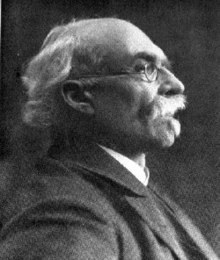Hans Vaihinger
| Hans Vaihinger | |
|---|---|
 |
|
| Born | September 25, 1852 Nehren |
| Died |
December 18, 1933 (aged 81) Halle, Province of Saxony |
| Alma mater |
Tübinger Stift, Tübingen Leipzig University University of Berlin |
| Era | 20th-century philosophy |
| Region | Western Philosophy |
| School |
Neo-Kantianism Fictionalism |
|
Main interests
|
Epistemology |
|
Notable ideas
|
Fictionalism, instrumentalism, nominalism |
|
Influenced
|
|
Hans Vaihinger (German: [hans ˈfaɪɪŋɐ]; September 25, 1852 – December 18, 1933) was a German philosopher, best known as a Kant scholar and for his Die Philosophie des Als Ob (The Philosophy of 'As if'), published in 1911 but written more than thirty years earlier.
Vaihinger was born in Nehren, Württemberg, Germany, near Tübingen, and raised in what he himself described as a "very religious milieu". He was educated at the University of Tübingen (the Tübinger Stift), Leipzig University, and the University of Berlin. He then became a tutor and later a philosophy professor at the University of Strasbourg, before moving in 1884 to the University of Halle, where from 1892 he was a full professor.
In Die Philosophie des Als Ob, Vaihinger argued that human beings can never really know the underlying reality of the world, and that as a result we construct systems of thought and then assume that these match reality: we behave "as if" the world matches our models. In particular, he used examples from the physical sciences, such as protons, electrons, and electromagnetic waves. None of these phenomena has been observed directly, but science pretends that they exist, and uses observations made on these assumptions to create new and better constructs.
Vaihinger admitted that he had several precursors, especially Jeremy Bentham's Theory of Fictions although he was largely unaware of Bentham's work until the very end of his life. In the preface to the English edition of his work, Vaihinger expressed his Principle of Fictionalism. This is that "an idea whose theoretical untruth or incorrectness, and therewith its falsity, is admitted is not for that reason practically valueless and useless; for such an idea, in spite of its theoretical nullity, may have great practical importance." Moreover, Vaihinger denied that his philosophy was a form of skepticism because skepticism implies a doubting, whereas in his 'as if' philosophy the acceptance of patently false fictions is justified as a pragmatic non-rational solution to problems that have no rational answers.
...
Wikipedia
